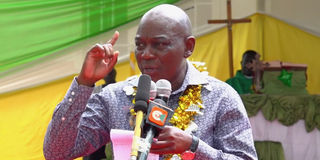Premium
Africans with Kenyan roots to get citizenship if draft law passes

The Kenya Citizenship and Immigration (Amendment) Bill, 2024 sponsored by Suba South MP Caroli Omondi seeks to enable Africans in the diaspora but with Kenyan roots to acquire citizenship through an expedited process.
What you need to know:
- If passed, Kenya will be the second country in Africa after Ghana to introduce citizenship by ancestry.
- Article 13 (2) of the Constitution provides that Kenyan citizenship can be acquired by birth or registration.
Africans in the diaspora who claim Kenyan descent by ancestry will be allowed to apply for citizenship if a new Bill before the National Assembly is passed.
The Kenya Citizenship and Immigration (Amendment) Bill, 2024 sponsored by Suba South MP Caroli Omondi seeks to enable Africans in the diaspora but with Kenyan roots to acquire citizenship through an expedited process.
Apart from acquisition of citizenship by birth, registration and naturalization as currently provided for in law, the Bill seeks to introduce a fourth category: citizenship by ancestry.
“A person born outside Kenya who claims Kenyan descent by ancestry may apply for citizenship subject to providing proof that the person has not been convicted of a criminal offence and been sentenced to imprisonment for a term not exceeding six months,” reads the Bill.
Genetic genealogy test

To determine the ancestry of someone applying for citizenship, a genetic genealogy test will be conducted by Kenyan authorities.
Genetic genealogy uses of DNA testing in combination with traditional genealogical and historical records. It involves the use of genealogical DNA together with documentary evidence and family history profiles to determine biological relationships between individuals.
Apart from the test, such persons will also be required to meet other conditions before citizenship is granted.
First, such a person will be required to show proof of reasonable financial resources as may be prescribed in law.
Second, the Bill provides that the individual must provide proof of ability to make a substantial contribution to the development of Kenya.
Third, the person must provide proof that they have not been convicted of a criminal offence and been sentenced to imprisonment for a term exceeding six months.

Suba South MP Caroli Omondi speaks during at a past event.
Mr Omondi says the conditions have been placed in order to avoid opening a window to criminals to come into the country.
“You must demonstrate that you are able to support yourself and also provide proof that there is something you are going to add to our economy,” said Mr Omondi.
Grow Kenya's income
He reckons that if the Bill is passed, it will increase government income streams as individuals interested in becoming Kenyans will also inject capital investments into the country.
Article 13 (2) of the Constitution provides that Kenyan citizenship can be acquired by birth or registration. It further says that acquisition of citizenship by registration requires a person to have been resident in the country for a continuous period of seven years.
“A person who has been lawfully resident in Kenya for a continuous period of at least seven years, and who satisfies the conditions prescribed by an Act of Parliament, may apply to be registered as a citizen,” says the Constitution.
The MP, however, argues that this provision is unfair to persons with Kenyan ancestry but whose parents were not Kenyan citizens and thus have no links to Kenya.
If passed, Kenya will be the second country in Africa after Ghana to introduce citizenship by ancestry.
The proposal which has already been approved by Speaker Moses Wetang’ula and is currently before the Budget and Appropriations committee for financial implications if implemented, before formal introduction into the House.





